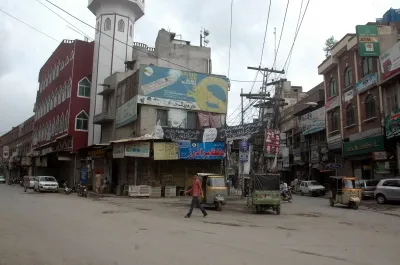Are Human Development Indicators in Pakistan Worsening According to UNDP?

Synopsis
Key Takeaways
- Human development indicators in Pakistan are declining.
- Pakistan relies on $14 billion in annual aid from multilateral agencies.
- The GSP+ status requires compliance with 27 conventions.
- The IMF aims for a 15 percent tax-to-GDP ratio by 2027.
- Climate change poses a significant threat to Pakistan's economy.
New Delhi, Nov 10 (NationPress) Officials from the UNDP, IMF, and World Bank have highlighted a concerning situation regarding Pakistan's economy, as the human development indicators keep deteriorating due to ineffective governance in a nation reliant on bailouts from multilateral institutions such as the latter two.
The United Nations Development Programme’s Resident Representative, Dr. Samuel Rizk, mentioned recently, "Pakistan's narrative presents two sides: one depicting macroeconomic stability, while the other reveals a decline in social and human development indicators that present significant challenges," as reported by The News International from Islamabad.
He indicated that Pakistan receives approximately $14 billion annually from various multilateral agencies, including the IMF, World Bank, and ADB, but its actual requirement is between 15 to 17 percent of GDP, translating to around $50 billion annually to achieve sustainable development goals. This goal is unattainable without integrating financing needs, he explained.
Moreover, he pointed out that an EU delegation is scheduled to visit Pakistan soon to assess the GSP+, which necessitates Pakistan's adherence to 27 conventions, as stated in the report.
GSP+ is a unique incentive scheme under the EU's Generalised Scheme of Preferences that allows developing nations to export over two-thirds of their goods to the EU without customs duties. To qualify, a country must be classified as vulnerable, exhibit limited export diversification, and demonstrate a commitment to sustainable development and governance by ratifying and enforcing 27 international conventions on human rights, labor rights, environmental protection, and good governance.
Despite India's emphasis on Pakistan's violation of these stipulations, the EU continues to uphold the country's GSP+ status.
The IMF’s Resident Representative in Pakistan, Chief Mahir Binc, underscored the challenges posed by Pakistan’s weak energy sector, inadequate institutional reforms, poor governance, low exports, an unwelcoming business environment, and a limited tax base, all of which hinder economic stability and growth, according to The News International report.
He noted that Pakistan is grappling with issues of revenue mobilization and energy sector losses, which obstruct export growth. The IMF aims to establish fiscal and export buffers by the conclusion of the ongoing Extended Fund Facility (EFF) and Resilience Sustainability Fund (RSF) programs by 2027. The tax-to-GDP ratio should ideally reach 15 percent according to IMF assessments, but it may only rise to 13 percent by 2027.
According to Bolormaa Amgabazar, the World Bank’s Country Director for Pakistan, the nation is projected to lose 20 percent of its GDP by 2030, primarily due to climate change and natural disasters. She questioned why Pakistan is lagging behind Bangladesh in curbing population growth. Additionally, she pointed out that stunting affects 40 percent of children in Pakistan, leading to an increase in learning poverty.
The World Bank warns that climate shocks will persist in Pakistan if proactive measures are not taken, as the country is already enduring the repercussions of environmental catastrophes. For instance, Lahore is facing hazardous levels of air pollution, endangering human life.










